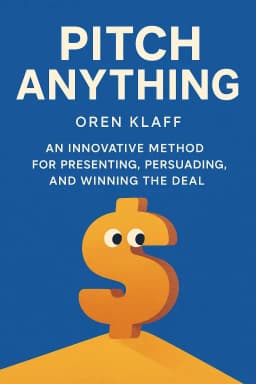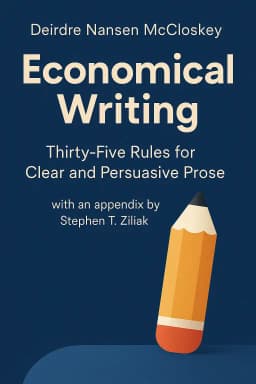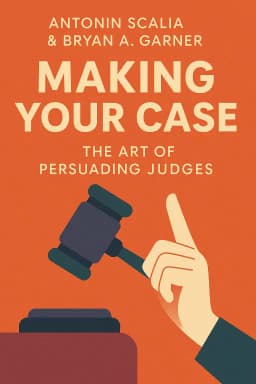
Pitching to the Croc Brain
An Innovative Method for Presenting, Persuading, and Winning the Deal
Golden Hook & Introduction
SECTION
Michelle: Here’s a fun, terrifying thought for your next big presentation: neuroscience suggests that up to 90 percent of your message is immediately thrown in the trash by your audience's brain. All that work, gone. Today, we're talking about how to pitch to the 10 percent that's left. Mark: Whoa, hold on. Ninety percent? That's horrifying. That means for every ten slides I prepare, nine of them are basically just background noise. Is that what Oren Klaff talks about in his book, Pitch Anything? Michelle: That's the brutal starting point. And what makes Klaff's perspective so compelling is that he isn't some academic in a lab. He's a high-stakes dealmaker who's raised over a billion dollars. He developed this method in the trenches of Wall Street, which is why it's so potent, and frankly, so polarizing for many readers. Mark: I can already tell this is going to be intense. Okay, so if my pitch is going straight into a mental shredder, what is this brain-level trash filter? You have to explain this.
The Croc Brain vs. The Neocortex: Why Your Pitch is Already Failing
SECTION
Michelle: Alright, let's get into it. Klaff breaks down the brain into three parts, but the real drama is between two of them. There's the neocortex, which is the smart, logical, PowerPoint-making part of you. It's where you craft your arguments and analyze data. Mark: Okay, that's the part I think I'm pitching to. Michelle: Exactly. But the problem is, your message doesn't go there first. It has to get past the gatekeeper: the crocodile brain. This is the oldest, most primitive part of our brain. It's been around for millions of years, and it only cares about survival. Mark: The crocodile brain. I'm picturing a tiny, grumpy reptile sitting at the entrance to my audience's mind. Michelle: That's a perfect image. And this croc brain is a very simple, very effective filter. It doesn't understand complex ideas or financial projections. It only asks three questions when new information arrives: Is this dangerous? Can I eat it? Can I mate with it? And if the answer is no, it has a fourth, default question for everything else: Can I ignore this? Mark: And for most business pitches, the answer is a resounding 'yes, please ignore this.' Michelle: A resounding yes. The croc brain sees a 40-page deck and immediately classifies it as boring and not a threat, so it sends it straight to the spam folder to save energy. Klaff uses a great example. Imagine you're walking to your car at night. It's quiet. Suddenly, someone behind you shouts "HEY!" Mark: My heart just jumped even thinking about it. Michelle: Right! Your croc brain takes over instantly. It doesn't analyze the tone or the context. It just floods you with adrenaline. Threat detected. Now, a second later, your mid-brain might recognize the voice as a friend. And a few seconds after that, your neocortex figures out, "Oh, he's just excited to see me." But the croc brain always, always gets the first say. Mark: Okay, so the croc brain is basically the bouncer at a nightclub. It's not interested in your life story or your well-reasoned argument for why you should be on the list. It's just making a snap judgment: threat, VIP, or boring. And our pitch is trying to get into the VIP lounge, which is the logical brain. Michelle: That's the perfect analogy. And most of us show up to the bouncer and start talking about our five-year growth strategy and synergistic value propositions. The bouncer just yawns and points to the exit. This is the fundamental disconnect. We're speaking neocortex to a croc brain. Mark: So how do you get past the bouncer? You can't just be louder. What's the secret handshake? Michelle: The secret handshake is novelty and intrigue. The croc brain is wired to pay attention to things that are new, surprising, or exciting because they might represent an opportunity or a hidden danger. It breaks the pattern. Mark: Give me an example. How does this work in a real pitch? Michelle: Klaff tells a fantastic story about pitching to a legendary, tough-as-nails investment banker he calls 'Jonathan.' Jonathan is the ultimate croc brain—he's seen thousands of pitches and is bored by all of them. He immediately starts dismissing Klaff's numbers, calling them "made-up," and his technology "ketchup." He's trying to get rid of him. Mark: That sounds like a nightmare. My own croc brain would be screaming "DANGER! ABORT!" Michelle: And that's what happens to most people. But Klaff, knowing he has to get past the bouncer, drops an intrigue bomb. He casually mentions that a famous NFL quarterback is already an investor in the deal. Mark: Oh, I see. Suddenly it's not a boring financial pitch anymore. It's something new. It's got a story. Michelle: Exactly. Jonathan's croc brain, which was half-asleep, suddenly perks up. "Wait, a quarterback? That's different. That's interesting." The bouncer unhooks the velvet rope and lets the message through to the more sophisticated parts of the brain. Klaff got his attention not by arguing harder, but by being more intriguing. Mark: That makes so much sense. You're not trying to win the argument; you're just trying to win the next five seconds of attention. And you do that by being the most interesting thing in the room. Michelle: You've got it. And that idea of controlling attention is the gateway to Klaff's biggest, and most controversial, concept: Frame Control.
Frame Control: The Unspoken Battle for Dominance
SECTION
Mark: Frame control. It sounds like something out of a sci-fi movie, like you're manipulating reality. What does that actually mean in a meeting? Michelle: It's less about manipulating reality and more about controlling the context through which reality is viewed. A frame is basically a person's perspective, their lens on the world. When two people meet, their frames collide. And Klaff's core argument is that the stronger frame always absorbs the weaker one. There is no merging. One wins, one loses. Mark: So it's an unspoken battle for who sets the terms of the conversation. Whose world are we living in for the next 20 minutes? Michelle: Precisely. And if you don't control the frame, you will be controlled by theirs. The most painful and vivid example of this in the book is the story of a young CEO named Tom Davis. He's pitching a billionaire corporate raider, Bill Belzberg. Tom is brilliant, he's rehearsed, he has a bulletproof pitch. He walks in feeling confident. Mark: I have a bad feeling about this. Michelle: You should. Tom starts his introduction, and Belzberg immediately cuts him off. He doesn't let him get to slide two. He just leans forward and says, "Look, I only want to know two things from you. What are your monthly expenses, and how much are you paying yourself?" Mark: Oof. That's a power move. He completely derailed the entire presentation. Michelle: He didn't just derail it; he shattered Tom's frame. Tom had a "brilliant young CEO" frame. Belzberg imposed a "you're just another kid asking for my money" frame. Tom was so flustered he couldn't even answer these simple questions. He stammered, he lost his composure, and the deal was dead before it ever began. His strong frame was absorbed in less than 30 seconds. Mark: Wow, that's brutal. I can feel the secondhand embarrassment. But it also sounds incredibly aggressive. Belzberg was just being a jerk. Are we supposed to be that guy? Michelle: That is the million-dollar question, and it's where the book gets its reputation for being so assertive. Klaff's answer is no, you don't have to be a jerk. But you have to be prepared to defy the other person's frame when it's being imposed on you. You can't just be polite and roll over. Mark: Defy the frame. What does that look like? You can't just tell a billionaire he's being rude. Michelle: You do it with what Klaff calls a "mildly shocking but socially acceptable act of defiance." He tells a story about being in a meeting where the main guy, a trader named Steve, is completely ignoring him. Steve is late, talks about himself, and then, during the pitch, he starts tracing his hand on the cover of the pitchbook like a bored third-grader. Mark: That is next-level disrespect. Michelle: Total power frame. So what does Klaff do? He doesn't ignore it. He doesn't get angry. He stops the presentation, gently takes the pitchbook away from Steve, and says, "Steve, I'm not sure I can part with this. It's the only one I have. But you're a great artist. Tell you what, I'll sell it to you for twenty bucks." Mark: No he did not. That's insane. What happened? Michelle: The whole room froze. The two junior analysts looked like they'd seen a ghost. But Steve, the power-framer, cracked a smile. He was intrigued. Klaff had broken his frame with a playful, unexpected challenge. He got Steve's complete attention for the rest of the meeting. He seized back control. Mark: Okay, but I have to push back on this. Klaff is a guy who, by his own admission, is a certain type of confident, alpha personality. He's been in these high-stakes rooms for decades. Can anyone else really pull that off? What if you're a young woman pitching to a room of older men? That "shocking act" could get you labeled as difficult or aggressive and get you thrown out of the room. Michelle: You're hitting on the most important and nuanced critique of this method. And it's a valid one. The book has been criticized for having a very masculine, hardball tone that might not translate for everyone in every context. The principle isn't to copy Klaff's exact moves, because that would be inauthentic and could backfire spectacularly. Mark: Right. So what's the underlying principle then, if not to be a lovable rogue? Michelle: The principle is to recognize when you're being put into a low-status position—what he calls a "beta trap"—and to find a small, authentic way to reassert your own value. It might not be a witty comeback. It could be as simple as pausing, taking a sip of water, and calmly redirecting the conversation back to your agenda instead of letting them pull you down a rabbit hole of irrelevant questions. It's about refusing to be frame-controlled.
Synthesis & Takeaways
SECTION
Michelle: And that really connects the two big ideas we've talked about. The whole game is a primal dance of attention and status. First, you have to get past the croc brain's defenses with something new and intriguing. Then, once you have their attention, you have to hold your ground—your frame—when it's inevitably challenged. Mark: So it's not about memorizing Klaff's aggressive one-liners or learning how to be a corporate shark. It's about understanding the principle: you can't let the other person's reality, their frame, completely take over yours. You have to walk in believing that you are the prize, not the one begging for scraps. Michelle: You are the prize! That's the core of it. And that's why he has a whole chapter dedicated to eradicating neediness. The moment your croc brain signals to the other person, "I really need this deal, please like me," you have lost. Your frame collapses because it's built on a foundation of desperation. Mark: It's the classic rule of dating, isn't it? The person who cares less has all the power. People want what they can't have, or at least what seems like it might walk away. Michelle: Exactly. The ultimate frame is one of quiet confidence. It's the genuine belief that you bring immense value, and you're there to see if they are a good fit for you. Klaff's mantra before a big pitch is, "I don't need these people; they need me. I am the prize." It's a mental shift from supplicant to peer. Mark: That is a powerful, and honestly, a very difficult mindset to master, especially when you're just starting out or you actually do need the deal. It feels like a high-wire act. Michelle: It is. But understanding the hidden dynamics is the first step. You stop seeing a pitch as a logical presentation and start seeing it as a social performance where status and attention are the real currency. Mark: I'm really curious what our listeners think about this. Is this a brilliant strategy for navigating the brutal realities of business, or is it a manual for becoming the kind of person you wouldn't want to work with? Let us know your thoughts on our socials. Michelle: This is Aibrary, signing off.









